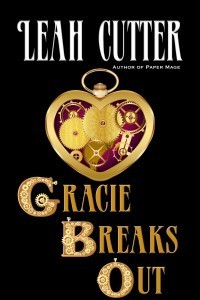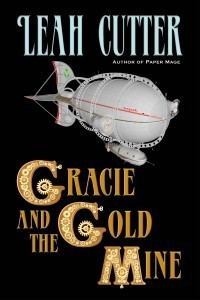Leah R. Cutter's Blog, page 13
January 22, 2015
Business for Breakfast, Volume 1: Chapter Two
The following is a chapter from Business for Breakfast, Volume 1: The Beginning Professional Writer.
The ebook is available from Amazon, Kobo Books, Barnes & Noble, iBookstore, and the paper version is available from Createspace.
However, if you’re like most writers (broke!) I will also be posting a chapter a week, so you’ll merely have to have patience to read all twelve chapters.
Chapter 2
Property
For your writing business, what do you create?
I know, I know. Stories. Novels. Worlds. Intergalactic government plots. Descriptions of pure love that leave your readers in tears.
All of that may be true.
But those are all the writing side of that creation.
What do you create in terms of the business?
This chapter describes the concept of intellectual property, as well as introduces some of the important concepts around copyright.
Copyright, the Beginning
First of all, I recommend that you read The Copyright Handbook from NOLO Press.
Yes, it’s a huge tome. Maybe alternate your reading of it with this book and tackle it twenty minutes at a time.
I know a writer who opens that book at random once a week, when she has a couple of hours to spare. She’ll find a specific aspect of copyright that interests her, then she’ll do a deep dive of that topic to thoroughly understand it.
Whatever your method, as an artist/writer, you must understand copyright. This is not something you can pass off to your business partner or agent.
Let me put it this way, when you “sell” a story, what exactly are you selling?
For your business, how can you sell something if you don’t know what it is you’re selling?
The Subdivision
Kudos to Dean Wesley Smith for coming up with the subdivision metaphor.
When you make the decision to start writing, you have just sectioned off a subdivision; that is, a large piece of land on which you are about to build houses, flats, and parks.
Every time you write a short story or a novel, you are building a house in that subdivision.
If you write many books in a series, you might want to think about it as developing a neighborhood in that subdivision.
A building, on a lot, is a physical piece of property.
Every story or novel you create is also property, but it’s called intellectual property.
In many ways, intellectual property is treated identically to physical property.
When you “sell” a short story or a novel to a publisher, are you actually selling the property?
No.
(That is, not if you’re smart and you haven’t signed away all your rights in the contract. But going into depth about contracts is beyond the scope of this book. It may be covered in detail in a future Business for Breakfast volume.)
What you are doing is licensing rights to the publisher for a specific amount of time.
The publisher pays you for that license.
They do not own the property.
They are merely renting a particular house in your subdivision.
Again, watch your contracts to make sure that they can’t make changes to that house without your written approval. (These are often referred to as moral rights.) This would include being able to complete rewrite your material without your approval or review.
You also need to be aware of competition clauses in contracts, so that you can continue to build similar houses in that subdivision or neighborhood.
Apartment Buildings (or Flats)
To continue with the metaphor, sometimes instead of an individual house you end up building a larger building with many individual rooms inside of it for rent.
Only one person can rent an single room at a time.
But all those rooms can be rented.
That is, you can individually license the audio rights, the German language rights, the screenplay rights, T–shirt printing rights, roleplaying game rights, etc.
Each of those forms of your work is an individual room you can rent in that one property.
Again, watch your contracts. Make sure that you’re not giving away the entire building when you sign a contract.
Form
Copyright is based on the form of the work. That is, once you commit a work to a format, such as when you save an electronic file, it is automatically copyrighted.
NOTE: There are some exceptions to this. Recent court cases have not accepted backups to a cloud as being copyrighted. Print is still king.
This means that the copyright for an electronic work is separate for the copyright for a printed work, etc.
It is no longer required that you must specify Copyright © by XXX DATE. For a few years, back in the 1980s, it was. If that attribution was accidently left off your book, the material automatically entered public domain.
However, it’s still a good idea.
And remember, you’re copyrighting the form.
When you create a print–on–demand book, you can specify the following:
Interior design copyright © by XXX DATE
Registration
In the United States, you can also register your copyright. There are other conventions in other part of the world to accomplish the same thing—you’ll need to look up what is legal where you live.
Registering your work is different than merely copyrighting your material.
The difference has to do with how the courts treat your work if someone tries to steal it, which is also called infringing.
You can claim statutory damages if your work is registered.
In the United States, this means that the court can fine the person who has stolen your work for every copy produced.
For example, if the person who stole your work produced an electronic copy, and thousands of copies were purchased, the court could charge them for every single copy that was sold, between $750 to $30,000 per copy.
Does it makes sense to register every single piece of work you produce?
Probably not. It costs money and takes time.
When should you register your copyright?
My rule of thumb is to register longer works (i.e., novels) and any property that I think is an office building, not a simple house.
That is, if I think a property has more than one room I can easily license, I’ll register the copyright.
In the United States, the site for registering your copyright is: http://copyright.gov/eco/
Signing Away Rights
You can only sign away your copyright.
There must be a signed agreement between the parties.
HOWEVER.
The courts have accepted the Terms of Service agreements, the online kind that nobody except copyright geeks like me read as signed agreements.
You might want to start paying attention to those agreements before you automatically scroll to the bottom and click “I agree.”
In addition, in the United States, at this time, the only place where verbal agreements are legally binding are in California.
So be careful if you’re talking on the phone with someone from Hollywood. There are unscrupulous people out there. They might claim at a later date that the twenty–minute conversation you had about your cats was actually when you verbally told them they could produce your work for nothing, that you verbally gave them your copyright.
In Conclusion
These are the three things you need to remember about property:
In many ways, intellectual property is treated the same way as physical property. Every story or novel you create is another house in your subdivision.
Copyright is by form, which you can specifically register for greater protection against someone stealing (infringing) your work.
You can only sign away your copyright.
This book is available from Amazon, Kobo Books, Barnes & Noble, iBookstore, and the paper version is available from Createspace.
Crossposted from my website. If you'd like to comment, you can do so here or there.
January 15, 2015
Business for Breakfast: Chapter One
The following is a chapter from Business for Breakfast, Volume 1: The Beginning Professional Writer.
The ebook is available from Amazon, Kobo Books, Barnes & Noble, iBookstore, and the paper version is available from Createspace.
However, if you’re like most writers (broke!) I will also be posting a chapter a week, so you’ll merely have to have patience to read all twelve chapters.
Chapter 1
Breaking Up Is Hard To Do
Writing is a great, great thing. And it may be all you’ve focused on until now.
However, your writing is not the same as your business.
Even before money gets involved, you must start thinking about your business, not just your writing.
This chapter is all about separating you, the artist/writer, from your business.
As a writer, you’re already used to having different voices, people, characters in your head.
Your business is just one more separate entity. Another voice you’ll need to learn about and use.
Doing Business As (DBA)
DBA stands for Doing Business As. It may or may not be called that in your state or country. For example, in Washington state, it’s called trade name. In Idaho, it’s called a business license. In California, it’s called a Fictitious Business Name.
Do you need a DBA? Unfortunately, the answer is, it depends. Not just on your intention, but your state and country.
If you are going to be publishing your work, you probably need a DBA for your publishing house. (Again, check your state or country laws.)
If you are submitting your work to publishers, you may or may not need one, depending on your state or country’s banking laws.
Why do you need a DBA?
Because this is part of the breaking apart of you and your business.
Businesses have their own separate checking accounts. Their own separate credit cards. Their own separate accounting.
In Washington state, I needed a DBA in order to open up separate checking accounts for my businesses.
In your state or country, you may also need a DBA to open up separate banking accounts for both your writing business and your publishing business.
The Whys
Why do you need a separate checking account?
To make it easier to keep track of both income and expenses.
But I don’t have any income yet!
That may be true today. It may be true a year from now.
Will it still be true five years from now? Ten years from now?
You are setting up the structure now, so that when you do start making money, everything will be in place and you won’t be scrambling or in a panic.
Which means I can do this a year from now, right?
There’s another reason why you want to separate your writing from your business, and to do it sooner rather than later. Before you start earning income.
Taxes
First of all, the disclaimer: I am not a tax professional, nor do I play one on TV. I cannot actually give you tax advice.
All I can do is to make you aware of some things.
Even if you don’t care about saving money on your taxes, you should still understand the following principles.
In the United States, as your business, you are generally what is called a sole proprietor. This means that on your taxes, you’ll fill out something called a Schedule C.
I know. I know. Deep breaths. It’ll be okay. I’m not about to get into the nitty–gritty of something like a Schedule C. You’ll need to talk to a tax professional about that.
All I’m here to tell you about is that, for the business of an artist/writer, a Schedule C may help you save money.
How?
By possibly lowering your taxable income.
(Notice all the weasel words in these statements. May. Possibly. Again, not giving you advice or guaranteeing you anything. Please don’t sue me.)
In the United States, one of the things that the Internal Revenue Service (IRS) looks at is whether your writing is a business or a hobby.
Generally, an activity qualifies as a business if it is carried on with the reasonable expectation of earning a profit.
Are you submitting your work? If the answer is yes, you have the reasonable expectation of earning a profit.
If you’re publishing it yourself, the answer to that is yes as well.
You must keep a record of your submissions as well as what you publish. That is enough to show to the IRS that your intention is to make money.
With that record, you are a business, not a hobby.
Three–Year–Profit Nonsense
Again, not giving you tax advice here. You need to make your own choice and decision.
There’s a lot of misinformation about “you must show a profit three years out of five.”
How long did Amazon.com go without showing a profit? Ten years? Twelve years? Are they even making a profit yet?
Yet no one would accuse them of being a hobby and not a business.
There is a difference between profit and income. I devote a whole chapter to it later.
If you’re worried that the IRS may think of your writing business as a hobby, there are plenty of ways to demonstrate your intent. For example, creating a website for your publisher. Having an Amazon Author page with all your independently published books listed. Maybe even registering as a DBA and having a separate checking accounts for your writing business.
All of these things show the intent to make money.
Which makes you a business.
Not whether you show a profit or not.
Deductions
I am not a Certified Public Accountant (CPA) nor do I ever want to play one on TV. All I can do is tell you about things I’ve learned about. I’m not giving you advice.
Why you keep good records and you keep track of everything?
So you can deduct legal expenses off your taxes.
Why do you care about that?
You pay taxes on your income.
Your expenses are subtracted from your income.
Lower income can mean lower taxes.
The IRS has lists of what count as business expenses here, including but not limited to:
Advertising expenses
Education expenses
Internet–related expenses
Subscriptions
So look at this list from your writing business point of view.
You take a workshop or a class about writing. That is an Education expense.
This is a business expense, that you can then deduct from your taxable income.
You write about horses. You’ve published short stories or novels about horses. You subscribe to Horse Lover’s Monthly magazine. This is a Subscription.
This is a business expense.
You purchase your own domain name. The domain registration fees are an Internet expense.
This is a business expense.
By subtracting your expenses from your income, you may lower my taxes.
In Conclusion
The three things you need to remember:
Separate yourself from your business, so that you can more easily keep track of expenses and show intent to operate as a business.
Keep good records of your intent to be a business (submitting or publishing your writing) as well as your expenses.
Intent is key. Not income.
This book is available from Amazon, Kobo Books, Barnes & Noble, iBookstore, and the paper version is available from Createspace.
Crossposted from my website. If you'd like to comment, you can do so here or there.
January 6, 2015
That end of the year review thang
For me, 2014 was kinda awesome.
I quit the day job. Started writing full time. Fell deeper in love with my sweetie. Wrote some great stories, things I’m really proud of. Traveled to New Zealand, as well as returned to New Orleans for Mardi Gras. Was only sick twice (TWICE!!! When I used to get sick once every 4-6 weeks…) Went to some workshops. Had some parties. Lived a good life.
The numbers:
–Wrote 458,000 words (7 novels, lots of short stories, and one business book)
–Had short stories published in two anthologies
–Published three other writers besides myself
–Wrote three stories for the Uncollected Anthology series
And on it goes.
For 2015, I have some grand fun planned.
–Write 600,000 words
–Get married in July
–Attend Sasquan and Orycon 37 (will make an appearance at Norwescon–but you might only see me in the bar.)
–Publish even more writers other than myself (have a couple in the lineup already)
–Publish a series of business books
I have other goals, fitness goals (continue to walk approximately 10,000 steps per day, do 20 pushups every morning, build my way up to 10 pull ups & 10 chin ups) and more publishing goals, etc.
But the primary writing goal, beyond the numbers, is to have fun. If I’m having fun writing, then I don’t need any discipline to write a lot of words. I find myself pulled back to the keyboard. It’s a great feeling. I want to continue to expand on that, really put it into practice this year.
I hope that all of you had a great 2014 and are looking forward to 2015!
Crossposted from my website. If you'd like to comment, you can do so here or there.
December 29, 2014
Wow–THANK YOU
I decided to put Paper Mage on sale for the Kobo Boxing Week Sale!
I’m impressed with the number of sales. Still don’t know if I’ll do it again. But this has been really nice.
So I figured I’d mention it again – that Paper Mage is currently 35% off at Kobo.
The promo code is: DECEMBER35
The sale runs from December 24th – January 5th.
The promo code only works for the books listed on this page.
So again – THANK YOU to all the readers out there! This is kinda awesome.
Crossposted from my website. If you'd like to comment, you can do so here or there.
December 24, 2014
For the first time ever
I decided to put Paper Mage on sale for the Kobo Boxing Week Sale!
For the first time, you’ll be able to get Paper Mage for 35% off.
The promo code is: DECEMBER35
The sale will run from December 24th – January 5th.
The promo code only works for the books listed on this page.
So go! Explore! There are some great reads there to enjoy.
Crossposted from my website. If you'd like to comment, you can do so here or there.
December 23, 2014
Next Gracie story available!
Woo and hoo!
The next Gracie story is now available! It’s the second story, chronologically speaking…
Here’s the blurb:
Gracie lives in town and works for Mr. Dickerson, hidden in the back room ’cause no one wants a mere girl fixing their whirligigs or automatons. Gracie fights against the attitude that girls should only get married and have babies, but no one will hire her on her own.
Then she meets the professor, an inventor who likes that she’s talented, that she has a mind of her own.
However, the professor is only in town for a short while. Can Gracie convince him to take her with him?
Or is Gracie going to have to break out on her own?
I started this story three times. Each time, I got several thousand words in, then had to throw out everything I’d done and start again. I’d written two other Gracie stories, and I just couldn’t find the start of this one. I had Gracie in town, first, then on the railroad (where she meets the professor) then at a mine–none of them worked.
I finally got her into Mr. Dickerson’s shop. But this story went in fits and starts. I finished it over the course of a weekend. I wouldn’t say I struggled with it, but I think I probably wrote an extra 5000 words that I ended up not using by the time I was done, scenes that I cut or that just wouldn’t work.
I still like where this story ended up. And I have a very good idea about the next Gracie story, chronologically speaking (Gracie’s Great Train Adventure.)
Gracie Breaks Out is available at your favorite retailer. The paperback will be available in the next couple of weeks.
Crossposted from my website. If you'd like to comment, you can do so here or there.
December 22, 2014
Finished!
Last Friday, I finished the first draft of my seventeenth novel.
*boggles*
*boggles some more*
I must admit I love this age we live in, when I can write what I want and publish it and trust that readers will find it. My sales continue to improve. (I figure my craft is improving as well, with all the practice I’m getting in.)
Hell, by this time next year, I may be fully supporting myself with this writing gig.
The next novel of mine will come out February 24th, Of Myst and Folly, a post-apocalyptic fairy tale.
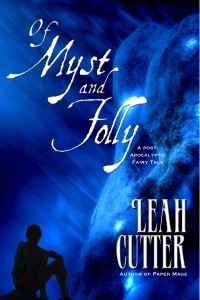
Bombs destroyed all the major cities of the world almost two centuries ago.
The bombs opened rifts. Magic and myst flowed into the world.
Electronic devices no longer work. Only simple mechanical devices. Man learned to farm again, in curving rows that myst can’t gather in.
For decades, the myst has gained strength slowly. Destroyed people, fields, villages a little at a time. Because the myst is scattered, unfocused.
When the myst finds its champion, will man survive?
After that, probably at the end of March, I’ll publish A Sword’s Poem.
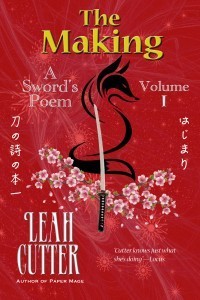

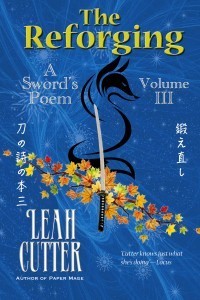
And after that, possibly the end of April, I’ll publish Tainted Waters, a sequel to Poisoned Pearls.
Crossposted from my website. If you'd like to comment, you can do so here or there.
December 16, 2014
New Gracie Story now available!
Huzzah!
The short story Gracie and the Gold Mine is now available!
The blurb:
When Mister Thomas tells Gracie he’s “acquired” a gold mine, Gracie knows something’s just not right with it.
She still bargains with him about helping him with it. She ain’t about to bet against him.
Will it all turn out to be fools gold? Or will they discover something more there?
—
While this is the third Gracie story that I’m publishing, it takes place much later.
Next week, I’ll publish another Gracie story, Gracie Breaks Out. Which is, chronologically speaking, the second Gracie story.
There will be more Gracie stories to come! I have lots of ideas for what will be the third story chronologically–Gracie’s Grand Train Adventure.
You can find Gracie and the Gold Mine at your favorite retailer.
The two other Gracie stories are: Gracie and the Whirligig and Gracie’s Fire.
Crossposted from my website. If you'd like to comment, you can do so here or there.
December 15, 2014
Starting early
On those 2015 goals…

This may not look like much, but I finally have a chin up bar installed!
My goal for 2015 is to be able to do 10 chin ups, as well as 10 pull ups. (Chins up, your palms face away from you. Pull ups, your palms face you.)
In 2014, in July, I started doing 20 pushups every day. Did I start off doing 20 pushups? Heck no. I actually started in May, with the stupidly easy goal (for me) of doing 10 pushups a day. I did that for a week, then the next week, moved to 11 pushups, etc., building my way up to 20 pushups. Now, I do somewhere between 20-25 per day. (Depends on how I feel.)
Currently, I can do two pull ups. I can almost do a single chin up. I’m working on it. I go and use the bar regularly, every other day.
Another goal of mine for 2015? Press ups. Basically, handstand pushups. On the days I’m not doing chin up/pull ups, I’m doing handstands. I want to work my way up to 5 handstand pushups.
I think it’s important to keep strong. Muscles are sexy. I won’t ever go back to the gym. But I will keep improving myself.
Crossposted from my website. If you'd like to comment, you can do so here or there.
December 12, 2014
Test
This is a test post. Don’t be surprised if it either multiplies or disappears at some point.
In the meanwhile, have a kitty picture.
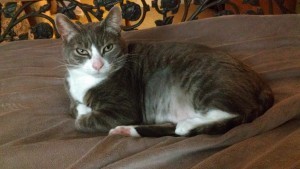
Crossposted from my website. If you'd like to comment, you can do so here or there.


